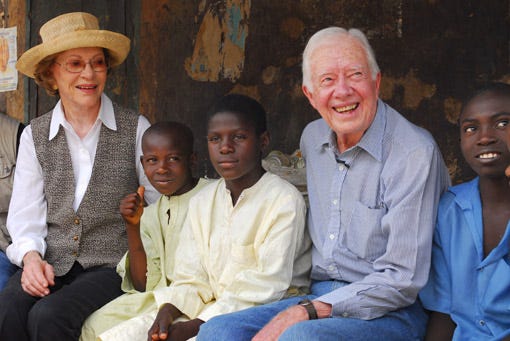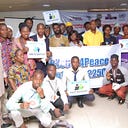Lessons from the 2002 Nobel Peace Prize Winner: Jimmy Carter

Life is a wonderful adventure, only if you choose to live well and for the greater good. To experience an adventurous life daily, a peaceful environment must be created. Few men are known to have invested and sacrificed hugely for world peace. Join me as I examine the life and times of one of the most prestigious world leaders to be awarded the Nobel Peace Prize- Jimmy Carter, the 2002 winner.
Jimmy is an American politician, philanthropist and former farmer who served as the 39th President of the United States from 1977 to 1981, a Senator from 1963 to 1967 and the 76th Governor of Georgia from 1971–1975. He was awarded the Nobel Peace Prize for his decades of “untiring effort to find peaceful solutions to international conflicts, to advance democracy and human rights and to promote economic and social development.”
Jimmy was born on October 1, 1924, as James Earl Carter Jr. in Plains, Georgia of the United States. His education included the United States Naval Academy, Georgia Institute of Technology and the Georgia South Western State University. He is married to Rosalyn Carter and has four kids. Carter has won accolades for his relentless work to advance the cause of peace both during his time as an American President and most importantly after his exit from power in 1981. During his presidency, Carter facilitated the groundbreaking Camp David Accords of 1978 between Israel and Egypt and prioritised respect for human rights in international politics during the height of the Cold War.
Outside the corridors of power, Carter’s impact has been phenomenal. He established the Carter Presidential Centre in 1982 to promote democracy, mediate conflicts and monitor elections around the world. His centre has played a major role in the control and eradication of diseases including guinea worm, river blindness, malaria as well as the reduction of stigma for mental health patients and boosting crop production in Africa. Carter Centre has monitored elections in over 40 countries around the world advocating for free and fair electoral practices. A devout Christian, Carter and his wife continue to volunteer with Habitat for Humanity, a Georgia-based philanthropy that helps low income working people around the world to build and buy their homes and access clean water. In 2007, Carter joined The Elders, a group of independent global leaders convened by the late Nelson Mandela who works together on peace and human right issues. He has written over 30 books ranging from political memos to poetry while continuing to actively comment on ongoing American and global affairs, such as the Israeli Palestinian conflict.

Jimmy Carter’s life and times inspire several lessons that I have identified including:
- Use of mediation and negotiation to promote peace in conflict environments. Jimmy Carter through the Carter Centre and his other endeavours have always sought to use mediation and negotiation as tools to bring about enduring peace around the world. This principle helped him broker the famous Camp David Accords between Israel and Egypt as the then President of the United States of America and has been a critical strategy for his centre. This realisation has been the principal approach of Building Blocks for Peace Foundation that guides its use of non-violent approaches in interventions in local communities in Nigeria.
- Getting involved in peace work starting right from where you are. Carter fought for his community in Georgia as a young man, rising through the ranks to become its governor before becoming an American president. Despite his prominence and stature, Jimmy and his wife, Rosalyn still volunteer at Habitat for Humanity building decent homes for strangers in their neighbourhood in Georgia. Start right where you are. Get engaged in something worthwhile for your local community. You do not need a position before you impact humanity. Carter continues to touch lives outside of politics.
- Have the utmost regard for people’s human rights. This is the cardinal principle of the Carter Centre that has led them to some of the most difficult places in the world simply to fight for the rights of people to fulfil their potentials. Injustice anywhere is a threat to people everywhere. Do your best to stand up for the rights of the vulnerable and the oppressed anywhere you find yourself.
To live an adventurous life, you just have to define it just like Carter did. ‘We can choose to alleviate suffering. We can choose to work together for peace. We can make these changes — and we must.” (Jimmy Carter, Nobel Lecture.)
There are several other lessons to learn from Jimmy Carter. I hope these few inspire you to act now and leave a remarkable impact in the hearts of men.
Written by:
Blessing Adebayo,
Research Assistant, Building Blocks for Peace Foundation
research@bbforpeace.org
